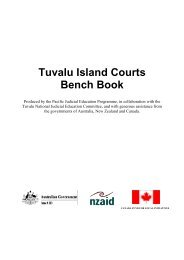Fiji Magistrates Bench Book - Federal Court of Australia
Fiji Magistrates Bench Book - Federal Court of Australia
Fiji Magistrates Bench Book - Federal Court of Australia
You also want an ePaper? Increase the reach of your titles
YUMPU automatically turns print PDFs into web optimized ePapers that Google loves.
7.2 Examination <strong>of</strong> Witnesses<br />
General<br />
The <strong>Court</strong> may at any stage <strong>of</strong> any trial, summon any person as a witness or examine any person<br />
in attendance though not summoned: s135 CPC.<br />
The <strong>Court</strong> may adjourn any case for up to 8 days and remand a witness where he or she:<br />
• refuses to be sworn;<br />
• having being sworn, refuses to answer any question;<br />
• refuses or neglects to produce any document or exhibit; or<br />
• refuses to sign his or her deposition: s137 CPC.<br />
Where you deem the examination <strong>of</strong> a witness is necessary for the ends <strong>of</strong> justice, and the<br />
attendance <strong>of</strong> such witness cannot be procured without unreasonable delay, expense and<br />
inconvenience, you may, with the consent <strong>of</strong> the parties, issue a commission to a Magistrate<br />
within the local jurisdiction to take the evidence <strong>of</strong> the witness: s139 CPC.<br />
Examination-in-chief<br />
The object <strong>of</strong> examining a witness by the party calling him or her is to gain evidence from the<br />
witness that supports the party’s case.<br />
Examination-in-chief must be conducted in accordance with rules <strong>of</strong> general application such as<br />
those relating to hearsay, opinion and the character <strong>of</strong> the defendant.<br />
There are also other rules that relate to examination-in-chief including:<br />
• the rule requiring the prosecution to call all their evidence before the close <strong>of</strong> their case;<br />
• leading questions; and<br />
• refreshing memory.<br />
Cross-examination<br />
The object <strong>of</strong> cross-examination is:<br />
• to gain evidence from the witness that supports the cross-examining party’s version <strong>of</strong> the<br />
facts in issue;<br />
• to weaken or cast doubt upon the accuracy <strong>of</strong> the evidence given by the witness in<br />
examination-in-chief; and<br />
• in appropriate circumstances, to draw questions as to the credibility <strong>of</strong> the witness.<br />
<strong>Fiji</strong> <strong>Magistrates</strong> <strong>Bench</strong> <strong>Book</strong> April 2004
















